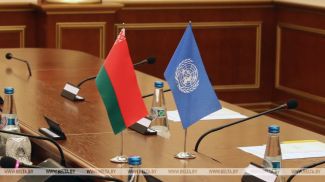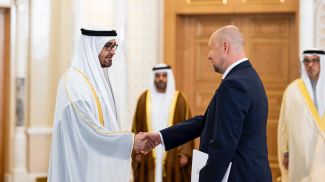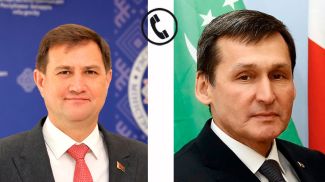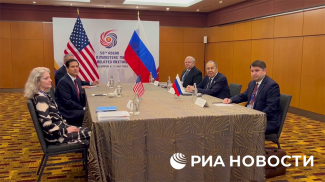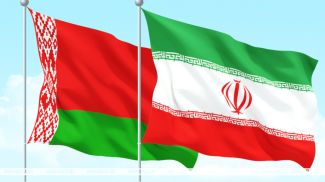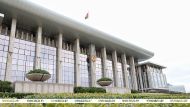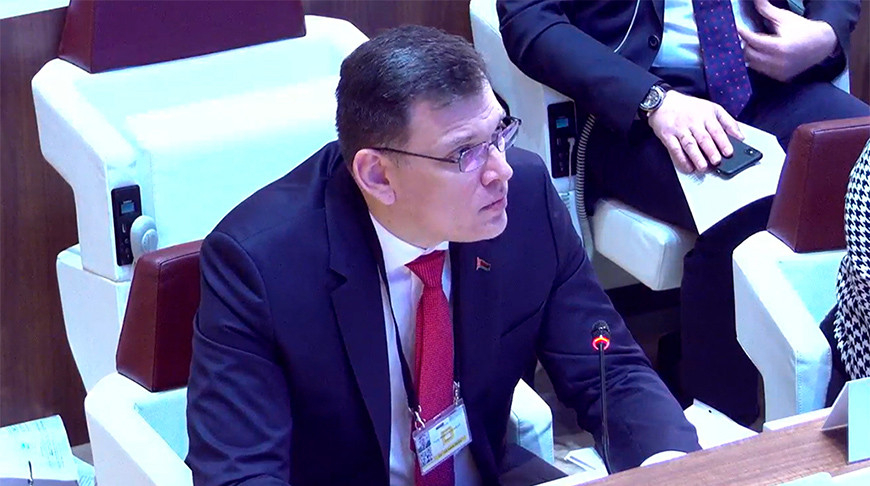
Yuri Ambrazevich. Photo courtesy of the Ministry of Foreign Affairs
MINSK, 14 March (BelTA) - Belarus is ready to share its experience in achieving the Sustainable Development Goals and invites all interested parties to the second National Forum on Sustainable Development in the middle of this year, Belarusian Minister of Foreign Affairs Yuri Ambrazevich said as he addressed the high-level policy segment of the UNECE Regional Forum on Sustainable Development in Geneva on 14 March, BelTA has learned.
The diplomat noted that transition to a multipolar world order is now in full swing, which is, unfortunately, accompanied by various crises. Thus, 2023 was a record year for the number of regional armed conflicts in the world over the past few decades. "Europe is still an arena of global military confrontation, a source of increased danger for humanity. Huge resources in European countries are redirected from the social welfare sector and the real economy into the arms race. In Greater Europe, barriers between regional economic unions are becoming more visible," the deputy minister said and cited a number of examples: restrictions on transportation, closure of border checkpoints, bans on trade, problems with banking transactions, a bans on visas, on cultural cooperation. All this, he said, clearly paints a picture of a new Iron Curtain.
"The prospects for pan-Eurasian land transit are growing more and more uncertain," Yuri Ambrazevich continued. “The energy infrastructure, which was meant to connect Europe and Asia, is rapidly transforming to cater for other markets. Western Europe was the main factor in the global food crisis, single-handedly provoking an increase in grain prices, depriving countries, in particular African ones, of access to Belarusian potash fertilizers."
According to him, all this suggests that the window of opportunities for implementing the Sustainable Development Goals in Europe has narrowed significantly. This also calls into question Europe's leadership role in the global achievement of the SDGs.
Belarus, in turn, realistically assesses the current situation and pursues its development strategy relying on its own strengths and like-minded partners in the Union State, the Eurasian Economic Union, the Commonwealth of Independent States, the Shanghai Cooperation Organization, and BRICS.
“Inside the country, we rely on a strong state that addresses systemic problems. The authorities are consistently developing partnerships with businesses, non-governmental organizations, the youth, and the academic community, whose invaluable contribution allows us to focus on more specific issues,” the deputy foreign minister noted.
The approaches used in Belarus can hardly be called innovative. On the contrary, they are traditional, but the main thing is that they are effective, Yuri Ambrazevich stated. "Thanks to them we have been able to withstand a hybrid war launched against our country in order to change its geopolitical orientation. In a situation when the United States, the European Union and other Western countries apply bans and restrictions on trade, on the transportation of goods, on the movement of people against ordinary Belarusian people and enterprises," the diplomat said.
At the same time, he noted that Belarus did not take a single unfriendly measure against Western countries: "We do not do this, because we understand that the reduction in cooperation inevitably leads to a reduction in opportunities for internal development. It is strange that the governments of Western states seem to believe that by depriving their citizens of the opportunity to cooperate with Belarus, they are doing them a favor. Without these Western self-restraints, everyone in the world would be much closer to the SDGs."
"The governance system of Belarus allows us not only to withstand the aggression of the West, but also to ensure the main thing: to maintain peace in the country and to ensure sustainable development," the diplomat noted.” In 2023, Belarusian GDP rose by 3.9%, which was several times higher than the EU average. As a result, Belarus fulfilled the national indicators for the achievement of the SDGs by about 80%. We are ready to share our national experience. In the middle of the year, Belarus will hold the second National Forum on Sustainable Development and will be happy to welcome all interested parties."
Belarus is convinced that it is only through engaged cooperation, joint efforts that we will be able to ensure global peace and global sustainable development, the diplomat said. "Belarus will continue to contribute to the search for sustainable peace in Eurasia, on the conditions acceptable to all. After a promising start in 2023, the Minsk International Conference on Eurasian Security will be made a regular event, following the president’s decision. We are convinced that keeping the sectoral expert interaction on social and economic issues between the UNECE member countries alive is the most important foundation for the future of the world," he said.




